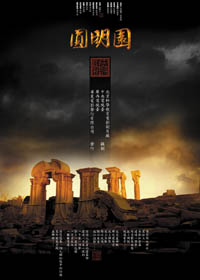| Home / Film in China / reviews | Tools: Save | Print | E-mail | Most Read |
| Yuan Ming Yuan |
| Adjust font size: |
A retelling of the construction, life, and eventual sacking by Franco-British forces of Beijing's old Summer Palace, Yuan Ming Yuan is the most ambitious Chinese documentary ever made. With a budget of ten million yuan– extravagant for a documentary even by Western standards – this film relies heavily on CGI reconstructions of the Qing dynasty summer retreat. One of the most captivating sequences in the film starts with a shot of today's ruins. We then watch as a building rebuilds itself and the surrounding fountains and gardens come vividly to life. Other scenes re-enact history using live actors against a largely CGI background. Because of its reliance on CGI and reenactment, director Jin Tiemu prefers to call it a "nonfiction film" rather than a documentary.
Yuan Ming Yuan is a visual feast and a well-researched and worthy historical document, but a riveting film it ain't. (That's Beijing by Carl Thelin January 29, 2007) |
| Tools: Save | Print | E-mail | Most Read |
 |
| Related Stories |
